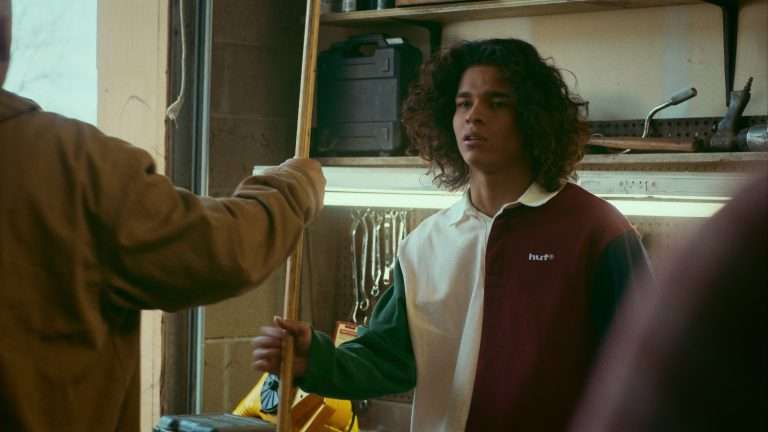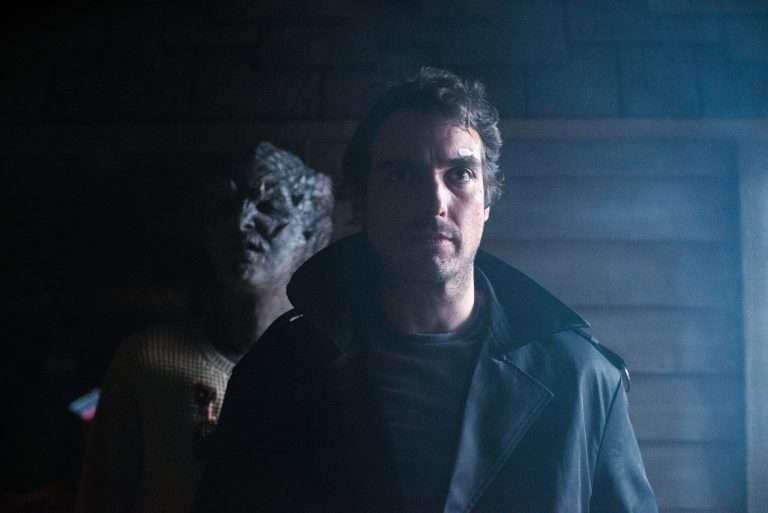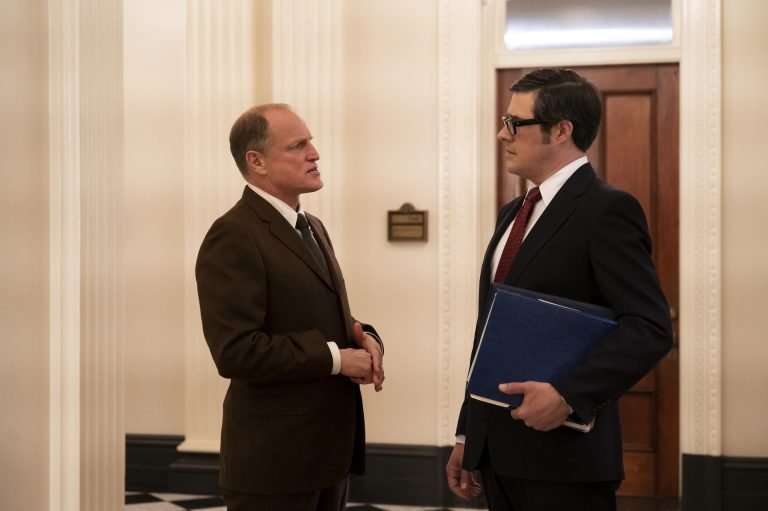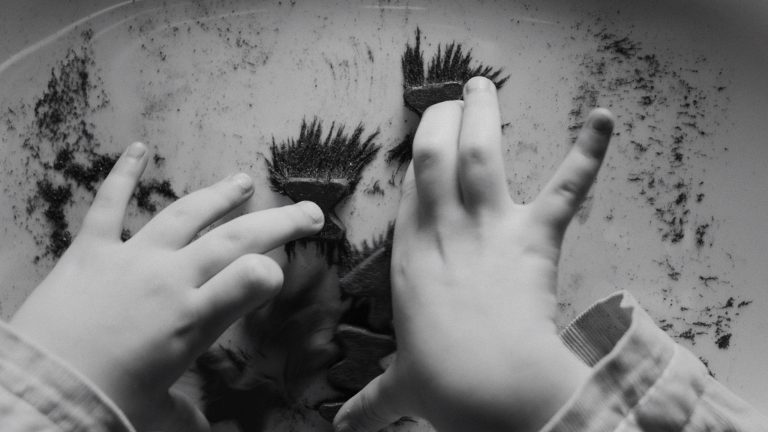Babak Anvari’s Hallow Road (2025) unfolds as a claustrophobic nightmare, where family drama collides with folk-horror dread. What begins as a late-night domestic quarrel steadily mutates into a haunting tale of guilt, loss, and the monstrous shapes grief can assume. Beneath the surface of its thriller framework runs a more unsettling meditation: how far will parents go to protect their child—and what remains when even that primal bond is shattered?
The film isn’t merely about a road accident. It is about buried secrets: Maddie’s unspoken guilt as a paramedic, Frank’s refusal to confront the truth, and Alice’s fragile pregnancy. Together, these fractures entangle the family in a relentless cycle of denial and destruction. By the end, the film leaves us uncertain—did Alice truly fall victim to supernatural forces, or did Maddie and Frank’s grief-stricken minds collapse under the unbearable weight of tragedy?
Spoilers Ahead
Hallow Road (2025) Plot Summary & Movie Synopsis:
What Happens to Maddie’s Family?
At 2 am, paramedic Maddie and her husband Frank are woken by a call from their daughter Alice, who confesses to hitting a girl with Frank’s car after storming out during a family argument. Maddie uses her training to guide Alice through CPR. But Alice panics when she hears the girl’s chest crack. Frank, more pragmatic and more desperate, urges her to stop and leave the body.
During their frantic drive, buried truths spill out. Alice admits she never called an ambulance. She’s been high on MDMA for hours, and she’s pregnant, something her parents previously argued should be ‘taken care of.’ Maddie confesses her own professional failure: misdiagnosing a patient, leading to their death. This car ride becomes both literal and metaphorical, the road binding them together, but also accelerating toward collapse.
When Alice claims another car has arrived, Frank orders her to hide the body. A mysterious woman appears, seemingly kind but increasingly predatory, interrogating Alice. Despite Maddie’s pleas, the woman doesn’t leave. Instead, Alice later reports that the girl she hit is alive and being tended to by the woman’s husband. The woman grows more menacing, claiming that she and her husband have ‘adopted’ lost girls before, and now Alice, pregnant and vulnerable, will be theirs. Maddie and Frank finally reach the site only to find Alice gone, a corpse in the undergrowth, and confusion mounting.
Also Read: 10 Great Psychological Thriller Movies You Can Stream on Hulu Right Now
When Maddie phones Alice, she answers, still alive, still in the clutches of the woman and her husband, who vow to ‘correct’ both her and her unborn child. By dawn, police surround the scene. Detectives conclude Alice died the previous night from a hit-and-run, dismissing Maddie and Frank’s story as a trauma-induced hallucination. The parents remain silent, broken, and uncertain of what they truly witnessed.
Why Does Alice Hide the Truth from Her Parents?
Alice’s lies, the fake ambulance call, hiding her drug use, and concealing her pregnancy, reflect her fractured trust with her parents. Her relationship with Maddie and Frank is defined by disappointment: Maddie is consumed by her own guilt, while Frank clings to control. High on MDMA and terrified, Alice withholds the truth because she knows her parents value image and survival over accountability. Symbolically, Alice represents a generation alienated from parental authority, left to wrestle with impossible choices alone. Her pregnancy and drug use only heighten this sense of abandonment.
Why Does Frank Insist on Taking the Blame?
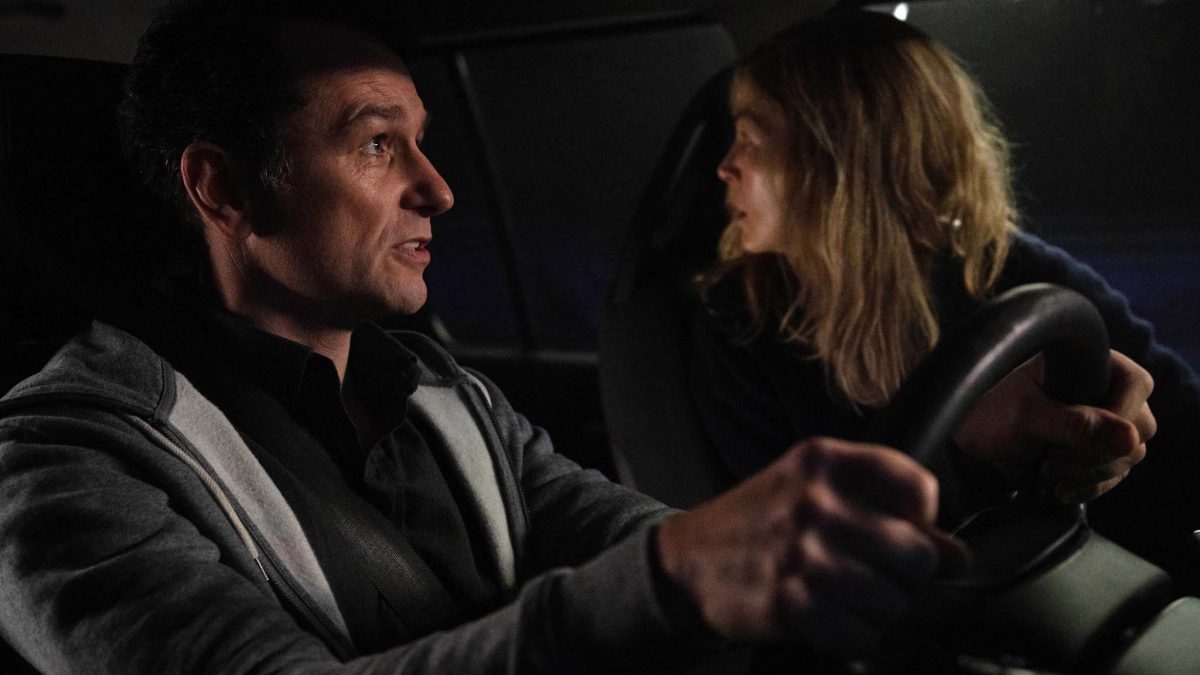
Frank’s declaration that he will take the fall for Alice is less about love and more about control. He cannot tolerate the thought of Alice ruining her life or the family’s reputation, so he offers himself as a sacrifice. His insistence mirrors his broader flaw: avoidance. Rather than confronting Alice’s mistakes or Maddie’s professional guilt, he papered over cracks until everything shattered. Frank’s protective instinct is real, but it is hollow. By choosing lies over accountability, he makes Alice even more vulnerable to the predatory couple who weaponize secrecy and shame.
Who Is the Mysterious Woman on Hallow Road?
The woman and her unseen husband are the film’s central ambiguity. Are they supernatural predators, human traffickers, or projections of Maddie and Frank’s trauma? On one level, the woman is terrifyingly real: persistent, manipulative, and disturbingly calm, she embodies the danger that stalks young women left unprotected. Her talk of ‘correcting’ Alice and her unborn child echoes cult-like conditioning, suggesting a ritualistic or supernatural dimension.
On another level, she may be a hallucination born of Maddie and Frank’s grief. The police insist Alice was already dead, and the phone calls might have been manifestations of their denial, unable to accept the corpse as their daughter. The brilliance of Anvari’s storytelling is that both readings remain possible.
Why Do Maddie and Frank Hear Alice Even After Finding Her Corpse?
This paradox sits at the film’s heart. The phone conversations after Alice’s supposed death can be read two ways:
- Literal Supernatural explanation – Alice is alive but abducted, the corpse is a decoy, and the woman and her husband are predators with powers beyond human comprehension.
- Psychological explanation – The calls are a shared delusion, born from Maddie and Frank’s refusal to accept that their daughter is dead. Their conflicting guilt (Maddie’s mistake at work, Frank’s failure as protector) fuels the hallucination.
Either way, their inability to reconcile with the truth dooms them.
What Does the Ending Mean?
The final shot, Alice’s corpse surrounded by police while Maddie and Frank stand silent, underscores Hallow Road’s central theme: grief’s corrosive power. If the detectives are right, Alice’s death was a tragic accident, and everything that followed was the parents’ trauma response. Their silence represents the collapse of hope, the refusal to speak a truth too painful to accept.
If Alice was indeed kidnapped, then the ending is even darker: no one believes Maddie and Frank, and their daughter has been swallowed by forces (human or otherwise) that thrive on parental failure. Either way, Alice is lost, physically or symbolically, and her unborn child becomes the haunting reminder of futures cut short.
Hallow Road (2025) Movie Ending Explained:
Was Alice Really Taken?
The film deliberately blurs the line between supernatural horror and psychological breakdown. Whether sinister new parents stole Alice or she was simply another casualty of reckless youth and tragic circumstance, the result is the same: Maddie and Frank are left powerless, unable to save their daughter. Maddie’s desperate phone calls echo her earlier paramedic failure; she cannot bring back the dead, only pretend she still can. Frank’s silence marks the futility of his protective posturing.
Together, they represent parents who wanted control but lost the one thing that mattered most. Thematically, “Hallow Road” suggests that some horrors are not external at all, but rooted in guilt, secrecy, and the lies families tell themselves. The true terror is not just the woman in the woods, it’s the silence that follows when no one believes you, and when grief leaves you stranded on a road that leads nowhere.


